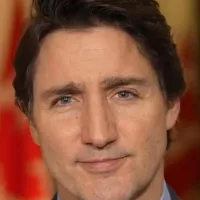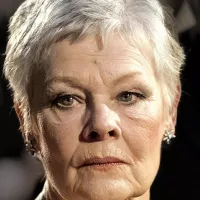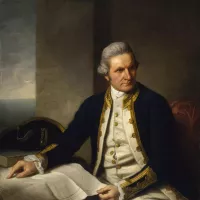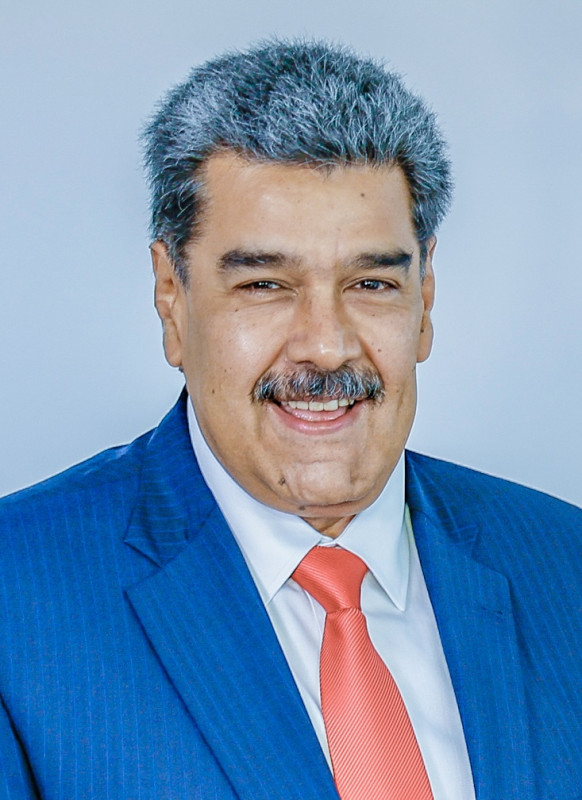How Nicolás Maduro built a successful career. Explore key moments that defined the journey.
Nicolás Maduro is a Venezuelan politician who assumed the presidency in 2013. Formerly the vice president and minister of foreign affairs under Hugo Chávez, his presidency has been marked by economic crisis and political turmoil. In 2026, he and his wife were captured by US forces and charged with drug trafficking, leading to his de facto removal from power. However, the Venezuelan government considers him the de jure president with Delcy Rodríguez as interim president.
4 hours ago : Venezuela's history, US aggression, and Trump's oil interests fuel ongoing tensions with Nicolás Maduro.
The US interest in Venezuelan oil, coupled with historical context of Venezuelan families, and the backdrop of US aggression, exacerbates the already tense situation with Nicolás Maduro. The situation has implications on education and resistance.
1983: Bodyguard for José Vicente Rangel
In 1983, Nicolás Maduro was employed as a bodyguard for José Vicente Rangel during Rangel's unsuccessful presidential campaign.
1992: Joined MBR-200 and Campaigned for Chávez's Release
In the early 1990s, Nicolás Maduro joined MBR-200 and campaigned for the release of Chávez when he was jailed for his role in the 1992 Venezuelan coup d'état attempts.
1998: Elected to Chamber of Deputies
In 1998, Nicolás Maduro was elected on the MVR ticket to the Venezuelan Chamber of Deputies, representing the Capital District.
1998: Founding of the Movement of the Fifth Republic
In the late 1990s, Nicolás Maduro was instrumental in founding the Movement of the Fifth Republic, which supported Chávez in his run for president in 1998.
1999: Elected to National Constituent Assembly
In 1999, Nicolás Maduro was elected to the National Constituent Assembly, representing the Capital District.
2000: Elected to National Assembly
In 2000, Nicolás Maduro was elected to the National Assembly, representing the Capital District.
2005: Elected President of the National Assembly
In 2005, Nicolás Maduro was elected as president of the National Assembly of Venezuela.
August 2006: Flores replaced Maduro as president of National Assembly
In August 2006, Cilia Flores replaced Nicolás Maduro as president of the National Assembly when he resigned to become Minister of Foreign Affairs.
2006: Became Minister of Foreign Affairs
In 2006, Nicolás Maduro became the Minister of Foreign Affairs.
2006: President of the National Assembly until 2006
Nicolás Maduro remained as president of the National Assembly of Venezuela until 2006.
2007: Luisa Ortega Díaz becomes Chief Prosecutor of Venezuela
In 2007, Luisa Ortega Díaz became the Chief Prosecutor of Venezuela, a position she held until her sacking in August 2017.
2010: Turnaround in relations with Colombia
In 2010, Nicolás Maduro oversaw a turnaround in relations with Colombia.
October 2012: Appointed Vice President of Venezuela
In October 2012, Nicolás Maduro was appointed Vice President of Venezuela, after the presidential elections.
October 2012: Appointed Vice President
On 13 October 2012, Chávez appointed Maduro Vice President of Venezuela.
2012: Became Vice President of Venezuela
In 2012, Nicolás Maduro served as the Vice President of Venezuela under President Hugo Chávez.
March 2013: Assumed Presidential Powers
In March 2013, upon the death of Hugo Chávez, Nicolás Maduro assumed the powers and responsibilities of the president. He was chosen as the Socialist Party's candidate in the election.
April 2013: Elected President
In April 2013, Nicolás Maduro was elected president, narrowly defeating opposition candidate Henrique Capriles.
October 2013: Maduro's Approval Rating Stands Between 45% and 50%
In October 2013, Maduro's approval rating stood between 45% and 50%, possibly due to Hugo Chávez's endorsement.
October 2013: Creation of Vice Ministry of Supreme Happiness
In October 2013, Nicolás Maduro announced the creation of a new agency, the Vice Ministry of Supreme Happiness, to coordinate social programmes.
November 2013: Maduro granted decree powers
In November 2013, six months after being elected, Maduro was granted the power to rule by decree by the pre-2015 Venezuelan legislature to address the ongoing economic crisis.
2013: Maduro Uses Anti-Gay Attacks as a Political Weapon
During the 2013 presidential campaign, Maduro used anti-gay attacks as a political weapon, calling representatives of the opposition "faggots". Maduro used anti-gay speech toward his opponent Henrique Capriles calling him a "little princess" and saying "I do have a wife, you know? I do like women!"
2013: Odebrecht Paid $35 Million to Fund Maduro's Presidential Campaign
In 2013, Euzenando Prazeres de Azevedo, president of Constructora Odebrecht in Venezuela, revealed that Odebrecht paid $35 million to fund Maduro's 2013 presidential campaign if Odebrecht projects would be prioritized in Venezuela.
2013: Assumed Presidency and won Special Election
In 2013, Nicolás Maduro assumed the presidency after Chávez's death and won the special presidential election.
October 2014: Maduro's Approval Rating Drops to 24.5%
In October 2014, Maduro's approval rating was at 24.5% according to pollster Datanálisis.
November 2014: Polls Indicate Venezuelans Believe Maduro Should Not Finish Term
In November 2014, Datanálisis polls indicated that more than 66% of Venezuelans believed that Maduro should not finish his six-year term, with government supporters representing more than 25% of those believing that Maduro should resign.
November 2014: End of first period ruling by decree
In November 2014, Maduro's first period of being given the power to rule by decree ended. The Venezuelan opposition strongly condemned the legislature's power that had been usurped by the court.
March 2015: Maduro granted decree powers again
In March 2015, Maduro was given the power to rule by decree by the pre-2015 Venezuelan legislature again to address the ongoing economic crisis.
April 2015: Maduro Sees Small Increase in Approval After Anti-US Rhetoric
In April 2015, Maduro saw a small increase in approval after initiating a campaign of anti-US rhetoric following the sanctioning of seven officials accused by the United States of participating in human rights violations.
December 2015: End of second period ruling by decree
In December 2015, Maduro's second period of being given the power to rule by decree ended. The Venezuelan opposition strongly condemned the legislature's power that had been usurped by the court.
January 2016: Maduro's decree powers by Supreme Court
In January 2016, Maduro was given the power to rule by decree by the Supreme Tribunal to address the ongoing economic crisis. The Venezuelan opposition strongly condemned the legislature's power that had been usurped by the court.
November 2016: Poll Finds Most Voters Would Oust Maduro in Recall
During a recall movement gathered from late-October through November 2016, a poll by Venebarómetro found that "88% of 'likely' voters in a recall would choose to oust Maduro."
2017: Tareck El Aissami Served as Vice President
Tareck El Aissami served Maduro as Vice President from 2017 to 2018.
September 2018: Polls Find Most Venezuelans Want Maduro Removed From Power
In September 2018, Meganálisis polls found that 84.6% of Venezuelans surveyed wanted Maduro and his government to be removed from power. Following the suspension of the recall movement, a Venebarómetro poll found that 61.4% found that Maduro had become a dictator, while in a poll taken by Keller and Associates 63% of those questioned thought that Maduro was a dictator.
2018: Datanálisis Poll Indicates Low Voter Support for Maduro
Before the 2018 presidential elections, a Datanálisis poll indicated that 16.7% of voters would vote for Maduro as candidate, compared to 27.6% and 17.1% of voters that would choose rival candidates Henri Falcón and Javier Bertucci, respectively.
2018: Maduro declared winner of presidential election
Maduro was declared as the winner of the 2018 election with 67.8% of the vote. The result was denounced as fraudulent by most neighboring countries and organizations but recognized as legitimate by others.
2018: Tareck El Aissami Served as Vice President
Tareck El Aissami served Maduro as Vice President from 2017 to 2018.
February 2019: Conflicting Polls Show Differing Approval Ratings for Maduro and Guaidó
A poll from 21 January to 2 February 2019 by Hinterlaces found that 57% of Venezuelans recognized Maduro as the legitimate president of Venezuela, while a Datanálisis poll found that, among the poorest 20% of Venezuelans, Maduro's support had fallen to 18% in February 2019 from 40% two years earlier.
February 2019: Surveys Indicate Most Venezuelans Recognize Guaidó as Interim President
During the presidential crisis, surveys between 30 January and 1 February 2019 by Meganálisis recorded that 4.1% of Venezuelans recognized Maduro as president, 11.2% were undecided, and 84.6% of respondents recognized Guaidó as interim president.
March 2019: Datanálisis Poll Shows Guaidó's Approval Soaring While Maduro's Hits All-Time Low
By 4 March 2019, a Datanálisis poll found Guaidó's approval at 61%, and Maduro's at all-time low of 14%, with Guaidó winning 77% in a theoretical election with Maduro, who received 23% of support.
May 2019: Analyst Says Maduro Is Extremely Unpopular
In a May 2019 analysis, José Briceño-Ruiz said that, based on the Meganalisis poll and other trends, Maduro was "extremely unpopular".
2019: Porras' criticism and economic policy changes
In 2019, Maduro's former chief of staff criticized his leadership, citing a lack of vision. Increased international sanctions in 2019 led the Maduro government to abandon socialist policies, resulting in a rebound from economic decline.
2022: World leaders interact with Maduro at climate conference
During the 2022 United Nations Climate Change Conference in November, multiple world leaders interacted with Maduro, including President of France Emmanuel Macron. Days later on November 27, the United States eased sanctions on Venezuela.
February 2023: Poll Shows Opposition Candidate Slightly Ahead of Maduro
In February 2023, a year before the 2024 presidential elections, a Datincorp poll concluded that 15.69% of voters would vote for Maduro as a candidate, in contrast to 16.86% that would vote for opposition candidate María Corina Machado.
June 2023: Maduro visits Saudi Arabia
In June 2023, Maduro made an official state visit to Saudi Arabia.
October 2023: US lifts some sanctions on Venezuela
In October 2023, the U.S. Department of the Treasury's Office of Foreign Assets Control (OFAC) lifted sanctions for six-months to allow limited trade with the U.S. to resume.
2024: Year of the next Venezuelan presidential elections
In February 2023, a year before the 2024 presidential elections, a Datincorp poll concluded that 15.69% of voters would vote for Maduro as a candidate, in contrast to 16.86% that would vote for opposition candidate María Corina Machado.
January 2025: Maduro Sworn in for Third Term Amidst Controversy
On 10 January 2025, Maduro was sworn in for a third term as president. Prior to that, the Supreme Tribunal of Justice (TSJ) described the CNE's statement of Maduro winning the election as "validated" on 22 August.
Mentioned in this timeline

Donald John Trump is an American politician media personality and...
Ukraine is a country in Eastern Europe the second-largest on...

Justin Trudeau served as the rd Prime Minister of Canada...

John F Kennedy JFK was the th U S President...
The United States of America is a federal republic located...

The White House located at Pennsylvania Avenue NW in Washington...
Trending

34 minutes ago Rosamund Pike recalls Judi Dench's 'naughty' side, calling her a 'mischief maker'.

2 hours ago Declan Rice's behavior scrutinized after derby win; Scholes deems him too emotional.

2 hours ago Donovan Clingan shines for Trail Blazers: Draft prospect improves shooting and raises questions.

35 minutes ago James Cook and Dion Dawkins to appear at Dick’s House of Sport opening.

2 hours ago Shakira's Mexico City Concert: Security, Tickets, and Traffic Updates

2 hours ago Courteney Cox wears 90s jeans, stays overnight with on-screen husband Greg Kinnear.
Popular

Jesse Jackson is an American civil rights activist politician and...

Susan Rice is an American diplomat and public official prominent...

Barack Obama the th U S President - was the...

Michael Joseph Jackson the King of Pop was a highly...

XXXTentacion born Jahseh Dwayne Ricardo Onfroy was a controversial yet...

Bernie Sanders is a prominent American politician currently serving as...
